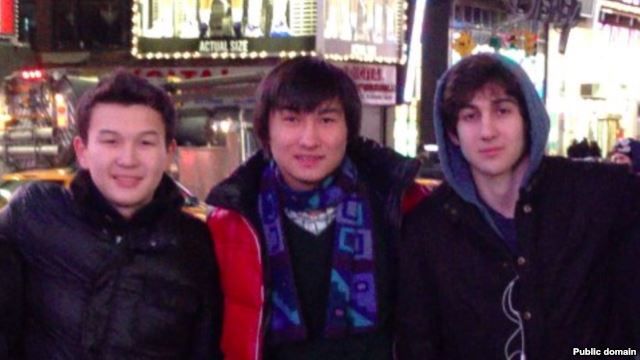 Azamat Tazhayakov and Dias Kadyrbaev with Dzhokhar Tsarnaev.Photo: VKontakteNews that the suspected perpetrators of the April 15 Boston marathon bombings have links to Kazakhstan – albeit extremely tenuous ones – has brought unwanted attention to this oil-rich Central Asian state neighboring Kyrgyzstan, where the two suspects have family roots.
Azamat Tazhayakov and Dias Kadyrbaev with Dzhokhar Tsarnaev.Photo: VKontakteNews that the suspected perpetrators of the April 15 Boston marathon bombings have links to Kazakhstan – albeit extremely tenuous ones – has brought unwanted attention to this oil-rich Central Asian state neighboring Kyrgyzstan, where the two suspects have family roots.
The media spotlight shone on Kazakhstan when two Kazakhstani students were arrested near Boston on April 20 over alleged immigration violations after being questioned by police about their links to suspected bombers Tamerlan Tsarnaev, who died in a shootout with security forces, and his surviving brother Djokhar, who is hospitalized and charged with using a weapon of mass destruction to kill.
It has also emerged separately that their uncle, Ruslan Tsarni, once worked in the oil business in Kazakhstan and was an associate of powerful figures close to Timur Kulibayev, son-in-law of President Nursultan Nazarbayev. On the strength of that association, Tsarni later testified in a UK court in favor of fugitive Kazakh oligarch Mukhtar Ablyazov, a sworn enemy of Nazarbayev’s, Forbes Kazakhstan reported on April 22.
Tsarni has been prominent in the US media in the aftermath of the bombings, condemning his nephews as “losers” and giving interviews about Tamerlan’s alleged radicalization.
According to some media reports, the Tsarnaev brothers lived with their uncle in Kazakhstan’s commercial capital, Almaty, for a time before moving to the United States, but the Kazakh Foreign Ministry says authorities have found no evidence supporting this.Like Kyrgyzstan, where the Tsarnaevs lived for years, Kazakhstan is home to a Chechen minority due to Stalin-era deportations of the Chechen community to Central Asia.
Tsarni, a corporate lawyer who held high-flying posts in Kazakhstan’s oil and gas sector, became a witness in a $6-billion dollar fraud case brought against Ablyazov by Kazakhstan’s BTA Bank, which Ablyazov headed until fleeing Kazakhstan in 2009 when the bank was forcibly nationalized.
In a witness statement presented in 2010 as part of the fraud case brought against him by BTA in the London High Court, Ablyazov – who went on the run after receiving a prison sentence for contempt of court in London in 2012 – cited Tsarni’s testimony in support of his case.
Ablyazov maintained that Tsarni’s evidence backed his defense (contested by BTA) that the bank was controlled directly or indirectly by Nazarbayev and that a network of interests close to Kulibayev was “deeply involved in controlling the current management of BTA.”
The connection between Tsarni and Ablyazov is unclear, but according to a business profile posted online a Ruslan Z. Tsarni was once a corporate lawyer at Nelson Resources Limited, a UK-registered firm with oil-and-gas interests in Kazakhstan.
There is no suggestion of wrongdoing on Tsarni’s part; the connection suggests only that Tsarni may once have had friends in high places in Kazakhstan, if Ablyazov judged him sufficiently important to ask him to testify. It also shows that Tsarni was willing to give evidence for a Nazarbayev foe in a high-profile case that angered the administration in Astana.
The two students from Kazakhstan under arrest in Boston, identified by Kazakh media as Dias Kadyrbayev and Azamat Tazhayakov, have a separate – and seemingly sketchy – connection to the Tsarnaev brothers which appears to center entirely on their acquaintanceship through their studies.
Dias Kadyrbayev’s father told Tengri News on April 23 that the pair were first questioned by police because “my son was friendly with [Djokhar] Tsarnaev in the student… hostel.” They were released “in connection with them not being involved” in the bombings, then arrested over immigration violations, he said.
The pair are accused of nothing more serious than breaking visa regulations, but they have been surrounded by media hype due to the publication of pictures of a car they allegedly drove with a license plate reading “Terrorista #1.” Murat Kadyrbayev said the license plate was a “gift from some Spanish friends” as a “joke of sorts” that has now “taken a dramatic turn.”
Kazakhstan’s Foreign Ministry stepped in with a statement on April 22 saying Astana was in touch with US officials over the case. It added that it “would like to reaffirm our openness to cooperation with the United States on the issue and emphasize that Kazakhstan strongly condemns terrorism and acts of terrorism in any form.”
For Kazakhstan, the spotlight of media attention over such nebulous links is unwelcome. Astana is a staunch ally of Washington in the war on terror, allowing NATO forces to use its territory to send equipment into and out of Afghanistan and offering diplomatic backing for Western forces’ in the region.
In the last two years Astana has confronted its own homegrown extremist threat, which began with Kazakhstan’s first ever suicide bombing in May 2011. Sporadic attacks in 2011 and 2012 left at least 70 people dead, mainly members of the security forces and suspects.
Astana reacted with a crackdown on radicalism, adopting a new and controversial religion law placing strict restrictions on the activities of religious groups and imprisoning scores of suspects on terror charges (105 people were convicted in 2012, according to official figures).
The demographic profile of those convicted of perpetrating or plotting attacks has shown that they are overwhelmingly young, male, and ethnic Kazakh, suggesting that homegrown extremism is not taking root among ethnic minorities – of which the Chechen community is one of many.
 В Атырау -10
В Атырау -10